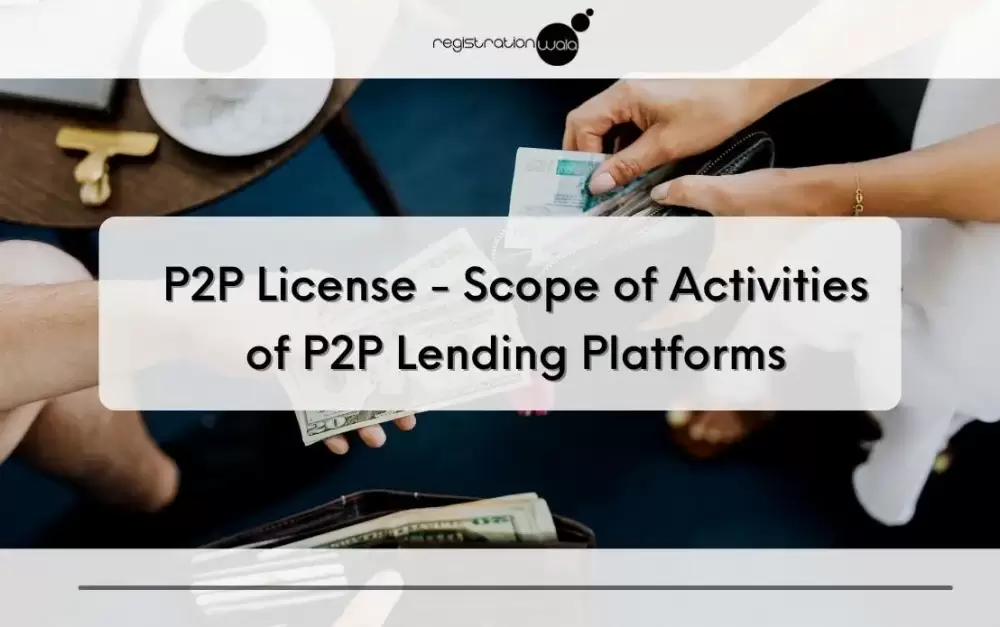P2P License - Scope of Activities of P2P Lending Platforms
- February 16, 2022
- Registrationwala

- Home
- /
- Knowledge Base
- /
- Regulatory License
- /
- P2P Lending License
- /
- P2P License - Scope of Activities of P2P Lending Platforms
P2P License - Scope of Activities of P2P Lending Platforms
P2P License is an RBI-issued business permit to establish a Peer to peer lending platform that allows the borrowing and lending of money by way of crowdfunding. It is a new way of lending and borrowing in India that removes the traditional lending method that, to many, is too complex. However, because this phenomenon is novel for India, many who want to start this business platform are unaware of the scope of this license.
This article is for them. Here, you learn about the activities you can perform once you obtain the NBFC P2P license in India.
But before you dive into the scope of activities that the licensee can engage with, it is critical to take a closer look at the concept of P2P lending.
What is Peer to Peer Lending?
P2P lending or peer-to-peer lending is the act of borrowing and lending money between “friends.” When you look at this term from a legal perspective, you see a form of lending where one entity can lend money to another. That entity is not a bank or any Non-Banking Financial Company. But instead, it is an individual.
The P2P lending platform allows lenders and borrowers to engage after account creation. The lenders get access to an array of borrowers. And the borrowers gain access to multiple lenders. Various lenders participate in the lending process when the loan amount is high. And collectively, they can provide money to the borrower. That is where the crowdfunding aspect of money lending comes in.
Scope of activities that a P2P license can engage with
When you get hold of the P2P registration, you can partake in the following activities:
- Acting as an intermediary: As a lending platform, you are running a website that acts as a non-human intermediary. Every service that you provide has a technological basis. Lenders use it to assess the borrowers, and borrowers use it to find suitable lenders.
- You cannot lend money on your own: Remember, you are merely acting as an intermediary – a bridge between a lender and a borrower, and nothing more. Thus, don't mistake yourself as a bank – attempting to lend money to the borrowers.
- You can't engage credit or arrange of guarantee: Peer-to-peer lending conventionally gives access to non-collateral loans. Even if a lender asks for a guarantee, as the holder of P2P registration, you do not possess the power to provide it.
- Secured lending is not within your power: As we already mentioned, the platform does not deliver secure lending services. Thus, you can’t permit any such form of lending to take place on your portal.
- No products other than loans: The Reserve bank of India is extremely strict about the regulations of Peer to Peer lending. Therefore, you must not attempt to sell financial products that are not part of the RBI rules.
- The International Flow of funds is forbidden: The P2P License in India is issued to start a platform to provide peer-to-peer lending services within the country. To ensure that foreign money doesn’t impact the sanctity of this service, RBI forbids international funds to enter the lending platform.
What happens if you go beyond the scope?
If you do not adhere to the scope of P2P Lending License India, the consequences can be severe. Therefore, before starting your business, go through all the RBI regulations. Obtaining a P2P lending license comes with many conditions. Following those conditions is the only way to sustain your business in the long run. Following all the rules concerned with a P2P platform is critical. Considering its regulations are still taking form, following these rules is the only way for your business to survive.
- 3550 views
